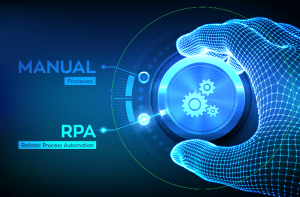
RPA: Accelerating Businesses for the Better
Why RPA?
Robotic Process Automation (RPA) will revolutionise the way business is transacted. Imagine a sales representative who spends his/her crucial time of the day entering data to enterprise resource planning (ERP) and customer relationship management (CRM) systems. In most cases employees enter data across multiple systems. As a result, data duplication, human errors, and low productivity are encountered. This is an everyday scenario of sales departments that are yet to embark on a robust digital transformation journey and embrace innovative technologies.
Technologies such as robotic process automation (RPA) can enable sales departments, to perform end-to-end sales activities by automating processes such as follow ups, sales order entry and invoicing, among others. RPA is not limited to sales teams alone but departments like finance, procurement, operations and even HR can adopt RPA to automate essential processes and improve their overall efficiency and productivity.
As data is growing by the day, the need for making it meaningful and actionable is what organisations can derive value from. However, analysing the data can be challenging, especially if done manually, leading to employee burnout and low productivity. RPA is capable of resolving all these challenges. It saves employees’ time dealing with monotonous tasks, allowing them to channel their efforts toward high value work. This can be understood better with a case study.
For instance, a company collects and analyses volumes of data to help other organisations make informed decisions. The company needs a scalable solution to derive insights from the data that would free up its employees to focus on other critical work such as improving customer experience. To achieve the goal, the company’s RPA implementation strategy can be built around eliminating the manual tasks involved in evaluating data. With an RPA solution, the company can reapportion the human time invested earlier toward engaging customers and now accelerate better, resulting in increased overall business output. Let’s dig deeper into the benefits of Robotic Process Automation.
Benefits of Robotic Process Automation
Enhance Existing Jobs
Expedite Business Workflows and Processes
Aggregate Data Across Different Systems
Customise Processes as per Need
RPA - the verdict is out
Today, Robotic Process Automation is enabling organisations to analyse structured data that’s coming their way. As a result, businesses are becoming more productive, reaping the benefits of digital transformation, and adopting dynamic business models. Automating repetitive processes with RPA allows employees to spend more time examining information that generates valuable insights. In a nutshell, RPA empowers employees to steer their organisation forward. Vendor selection is also important, UiPath has been constantly named as a leader in this space by Forrester.


